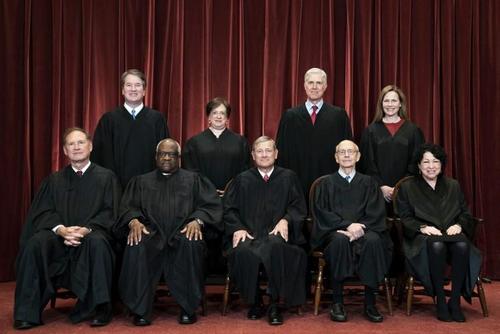Source: Zero Hedge
Authored by Maryellen Fullerton via SCOTUSblog.com,
The Supreme Court unanimously ruled on Monday that noncitizens who have been granted temporary humanitarian relief from deportation cannot use the process known as “adjustment of status” to obtain lawful permanent residency in the United States without leaving the country.
The court ruled in Sanchez v. Mayorkas that adjustment of status is reserved for those who were inspected at the border and admitted to the United States by an immigration officer, thus disqualifying the majority of those granted Temporary Protected Status.
Justice Elena Kagan wrote the opinion for the court.
Jose Sanchez and Sonia Gonzalez came to the United States from El Salvador without authorization in the 1990s. The U.S. government granted them temporary protection in 2001 when the United States designated El Salvador as part of the TPS program in the wake of devastating earthquakes in that country. Under the TPS program, foreign nationals living in the United States are permitted to remain here due to unsafe conditions in their home countries.
Sanchez and Gonzalez have maintained TPS status for 20 years, during which Sanchez’s employer filed an immigration-visa petition for Sanchez as a skilled worker. Immigration officials approved this petition, authorizing Sanchez to be admitted to the United States as a lawful permanent resident. They simultaneously approved Gonzalez, his wife, for admission as a lawful permanent resident.
The government, however, denied the couple’s subsequent application to use the adjustment-of-status process in order to transition from temporary to permanent residency without leaving the United States. Immigration officials ruled that the couple’s original unauthorized entry disqualified them from adjustment of status.
The government relied on the text of Immigration and Nationality Act Section 1255(a), which restricts the in-country adjustment-of-status process to noncitizens who were “inspected and admitted or paroled into the United States.”
Sanchez and Gonzalez argued that the TPS statute includes a provision making TPS holders eligible for adjustment of status even if they had not been inspected and admitted or paroled when they originally entered the United States. Specifically, Section 1254a(f)(4) states that “for purposes of adjustment of status under Section 1255 …, the [TPS holder] shall be considered as being in, and maintaining, lawful status as a nonimmigrant.” They asserted that the phrase “considered as being in … lawful status” makes the grant of TPS the equivalent of being inspected and admitted as a lawful nonimmigrant. Sanchez and Gonzalez argued the detailed vetting that accompanies applicants for TPS is equivalent to the vetting that accompanies inspection and admission at a port of entry.
The court sided with the government and rejected the interpretation advanced by Sanchez and Gonzalez.
“Section 1255 generally requires a lawful admission before a person can obtain LPR status,” Kagan wrote.
“Sanchez was not lawfully admitted, and his TPS does not alter that fact. He therefore cannot become a permanent resident of this country.”
Cases: Sanchez v. Mayorkas


